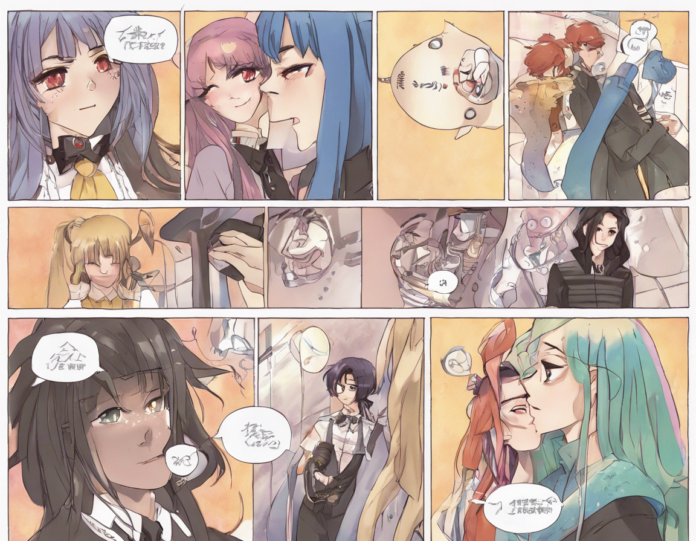Introduction
In the realm of manga and anime, a sub-genre that has been gaining popularity in recent years is the concept of gender bender doujinshi. Gender bender stories typically involve characters who undergo a transformation in which their gender is switched. This intriguing twist often leads to humorous, thought-provoking, and sometimes even poignant narratives that explore themes of identity, sexuality, and social norms. In this article, we will delve into the world of gender bender doujinshi, examining its origins, themes, and notable works within this vibrant literary niche.
Origins of Gender Bender Doujinshi
The origins of gender bender themes in manga can be traced back to ancient folklore and theatrical traditions in Japan. The motif of characters changing gender or disguising themselves as the opposite sex has been a recurring theme in Japanese literature for centuries. However, it was not until the modern era that gender bender stories began to emerge as a distinct sub-genre within manga and anime.
One of the earliest examples of gender bender themes in manga is Osamu Tezuka’s “Princess Knight,” which was serialized in the 1950s. This pioneering work featured a princess who must disguise herself as a male knight to inherit the throne. Tezuka’s manga laid the foundation for future gender bender narratives by exploring themes of gender identity and stereotypes in a fantastical setting.
Themes in Gender Bender Doujinshi
Gender bender doujinshi often explores themes related to gender identity, self-discovery, and societal expectations. By portraying characters who experience a transformation in their gender, these stories challenge traditional notions of masculinity and femininity, inviting readers to question the boundaries and limitations imposed by societal norms.
One common theme in gender bender doujinshi is the exploration of gender dysphoria. Characters who undergo a gender transformation may struggle with their new identity, grappling with feelings of confusion, discomfort, or rejection from others. Through these narratives, creators can shed light on the challenges faced by individuals who do not conform to traditional gender roles.
Notable Gender Bender Doujinshi Works
Several notable gender bender doujinshi works have captivated audiences with their imaginative storytelling and relatable characters. One such example is Kashimashi: Girl Meets Girl, a manga series by Satoru Akahori and Yukimaru Katsura. The story follows a high school student named Hazumu who is transformed into a girl after an encounter with an alien spaceship. Through Hazumu’s experiences, the manga explores themes of friendship, love, and acceptance.
Another popular gender bender work is Wandering Son by Takako Shimura, which follows the lives of two transgender children navigating the challenges of adolescence. This poignant coming-of-age story delves into the complexities of gender identity and self-expression with sensitivity and depth.
Challenges and Controversies
While gender bender doujinshi can provide a platform for exploring diverse gender identities and experiences, the genre is not without its challenges and controversies. Some critics argue that gender bender narratives may perpetuate stereotypes or trivialize the struggles faced by transgender individuals in real life. It is important for creators and readers alike to approach gender bender works with sensitivity and awareness of the nuances of gender identity.
Frequently Asked Questions (FAQs)
-
What is the difference between gender bender and transgender themes in manga?
Gender bender stories typically involve temporary or fantastical transformations in which characters switch genders, often for comedic or dramatic effect. In contrast, transgender narratives focus on characters who permanently identify with a gender different from the one assigned to them at birth. -
Are there gender bender doujinshi works that explore LGBTQ+ themes?
Yes, some gender bender doujinshi works delve into LGBTQ+ themes by portraying characters who grapple with their sexual orientation or gender identity in nuanced ways. -
Do gender bender stories perpetuate stereotypes about gender?
While some gender bender stories may rely on stereotypical portrayals of gender, many works strive to subvert stereotypes and challenge rigid notions of masculinity and femininity. -
Can gender bender doujinshi help raise awareness about gender diversity and inclusivity?
Yes, gender bender doujinshi have the potential to spark conversations about gender diversity, inclusivity, and the importance of respecting individuals’ unique identities and experiences. -
Are there any gender bender doujinshi works that address the intersection of gender and other social issues?
Yes, some gender bender doujinshi works explore the intersection of gender with other social issues such as race, class, disability, and mental health, offering nuanced perspectives on the complexities of identity.
Conclusion
Gender bender doujinshi occupy a unique and evolving space within the manga and anime landscape, offering creators and audiences a platform to engage with themes of gender identity, self-discovery, and societal norms in imaginative ways. By exploring the diverse narratives and compelling characters within this genre, readers can gain insight into the complexities of gender and the power of storytelling to illuminate the richness of human experience. As gender bender doujinshi continue to push boundaries and challenge conventions, they remind us of the boundless possibilities of storytelling to inspire empathy, understanding, and reflection.




















